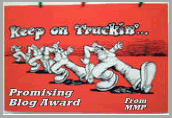So you want success, financial independence, freedom from worry and the ability to live your life the way you have always dreamed of.
Well, congratulations! You've come to the right place. Here you will learn about success and what it takes to achieve it. You will not only learn what it takes to be successful, but also learn a step-by-step process designed specifically to give you the POWER to be successful. This process works, so I suggest that you take it very seriously! You will find it to be enlightening and a lot of fun.
"Expect to win!"
It is one of the most beautiful compensations of this life, that no man can sincerely try to help another without helping himself.
-Emerson
"Every man takes the limits of his own field of vision for the limits of the world."
-Arthur Schopenhauer
The Empowerment Process, when completed, can enable you to:
- Build a strong, unshakable, foundation
- Understand what power is
- Understand where the power is
- Harness the power and most importantly
- Use the power to:
- See the possibilities
- Gain financial independence
- Succeed at whatever you desire
- Achieve and Surpass your goals
- Realize freedom from worry
- Attain serenity
- Live your dreams and
- Soar
If you have built castles in the sky, your work need not be lost; that is where they should be. Now put foundations under them.
-Henry David Thoreau
"Every man is the architect of his own fortune."
-Appius Claudius Caecus
Don't let life discourage you; everyone who got where he is had to begin where he was.
-Richard L. Evans
...The problem of life is to change worry into thinking and anxiety into creative action.
-Harold B.
Before we start, relax and take a few deep breaths. You may be at a low point in your life, emotionally drained and/or financially challenged. On the other hand, you may be in the best place you've ever been in and feel that you are very successful, emotionally healthy, and/or financially secure.
Where the determination is, the way can be found.
-George S. Clason, The Richest Man in
I've never been poor, only broke. Being poor is a frame of mind. Being broke is only a temporary situation.
-Mike Todd, theatrical entrepreneur
In either case, this program has much to offer. If you are currently discouraged, dejected, depressed, etc., The Empowerment Process will allow you to see beyond your current situation; the power to see the possibilities and the opportunities, and enable you to have the confidence necessary to act upon them. If you feel successful, this program can serve as an energizer and a source of continuous motivation. It will allow you to look at success in a way that you may never have looked at it before. It may even give you some insights into yourself and your real motivations. (If you are one who feels guilty about your success, perhaps this program can help you avoid apologizing for it, or even sabotaging, your success.) The Empowerment Process can add new dimensions to your success.
The world is round and the place which may seem like the end may also be only the beginning
-Ivy Baker Priest
Become a possibilitarian. No matter how dark things seem to be or actually are, raise your sights and see possibilities - always see them, for they're always there.
-Norman Vincent Peale
Before you can be successful you need to know what success means and prepare for it. You also need to know the ramifications of not understanding success and not preparing for it. The following analogy best illustrates the importance of being prepared for success.
Think of the desire for success as wanting to swim so badly that you jump in the water head first, without any preparation. After you hit the cold water, you realize that you have never taken the time to learn how to swim; you don't know how cold the water is and you don't know how deep it is. You, therefore, will either learn how to swim very quickly (very rare) or you will drown (most likely.)
Success, in many ways, is the same as this swimming analogy. You may not drown, but without the necessary understanding and preparation you probably won't be able to attain success, or if you do, you will not be able to sustain it!
...Getting ready is the secret of success.
-Henry Ford
The Empowerment Process will give you the tools you need to succeed. You will not only be able to recognize success, you will be able to pursue and achieve it.
The pessimist sees the difficulty in every opportunity; The optimist, the opportunity in every difficulty.
-L. P. Jacks
Most people don't understand where the real power lies. They think it lies with money and/or controlling others. That is not the definition of power, as defined by The Empowerment Process. That is simply wealth and manipulation. Once you have completed The Empowerment Process, you will know that the real power lies within you. You will have awakened the sleeping giant that is within you…..that is you. You will have the power. You will feel enlightened and charged as you gain more and more power and more and more control over your life.
Let a man radically alter his thoughts, and he will be astonished at the rapid transformation it will effect in the material condition of his life.
-James Allen
As you feel your power growing from within, you will start thinking more about your future success and less about your past failures. You will be able to actively follow your dreams. Keep in mind that your dreams should be within the laws of morality, man and physical reality. Beyond that the world is your oyster.
We should all be concerned about the future because we will have to spend the rest of our lives there.
-Charles F. Kettering
Man is as full of potentiality as he is of impotence.
-George Santayana
The Empowerment Process is divided into three Sections:
- "Section I" -Preparation & Explanation
- "Section II" -Understanding & Acceptance
- "Section III"-Ownership & Becoming
Active participation in this process is critical to achieving successful results. Jot down your feelings, impressions, desires, wants, needs, dreams, fears, thoughts, etc.
Some people make things happen,
Some people watch things happen,
And some people say "What Happened."
…Be in the first category
-Casey Stengel
It is also important that you re-read each quote very carefully to make sure you understand it; read it in conjunction with the narrative on the left side of the page. The quotes will help you to remember what you have read, giving emphasis to the right concepts which will help you to obtain the desired results from this program.
I quote others only in order the better to express myself.
-Michel De Montaigne
You may feel some resistance and possibly feel defensive as you continue. This is an expected reaction, since the process will be asking you to re-think some of your basic attitudes. However, please keep an open mind. If you can accept, and commit to, the premise that you deserve the best that life has to offer and that change is critical to the process, success will surely be yours.
There is nothing noble in being superior to some other man. The true nobility is in being superior to your previous self.
-Hindustani proverb
God, give us grace to accept with serenity the things that cannot be changed, courage to change the things that should be changed, and the wisdom to distinguish one from the other.
-Reinhold Niebuhr
For the rest of The Empowerment Process I will be referring to it as “The Process.”

































